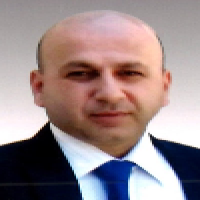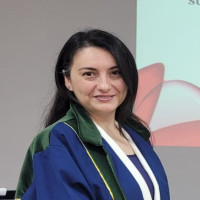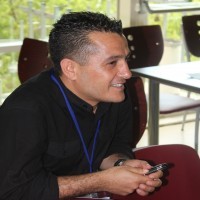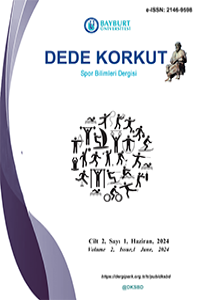Review Article
Research Article
Aim & Scope
The Dede Korkut Journal of Sports Sciences aims to provide an academic platform for researchers working in the field of Sports Sciences to share their scientific research and disseminate their findings through open-access publication.
In this context, the Dede Korkut Journal of Sports Sciences shares publications in Physical Education and Sports, Training and Movement, Recreation, Sports Management, Sports and Health, Game and Sports Culture, Sports History, and Traditional Turkish Sports within the scope of Sports Sciences. Additionally, due to the interdisciplinary nature of sports science research, original research conducted in different scientific fields, review studies based on in-depth analysis and interpretation, and letters to the editor are also published in our journal. Scientific articles submitted for publication to the journal are expected to share unique practical examples and new findings specific to sports sciences within the framework of ethical rules, whether they are theoretical or applied research.
Author Guidelines
WRITING RULES AND ARTICLE FORMAT
(Authors are requested to prepare their works considering this format) Studies submitted to the Dede Korkut Journal of Sports Sciences (DKSBD) should follow the publication rules below.
The publication language of the Dede Korkut Journal of Sports Sciences (Dede Korkut Journal of Sports Sciences) is Turkish and English.
The Dede Korkut Journal of Sports Sciences publishes original works that have not been published in any other medium in physical education and sports sciences or interdisciplinary studies related to sports sciences.
The corresponding author must sign a form (Attachment: Copyright Transfer Form) declaring that the work submitted for publication to DKSBD has not been published or submitted for publication elsewhere and that all publication rights have been transferred to DKSBD and send it to the journal editor as a file attached to the work.
The "TÜBİTAK ULAKBİM DERGİPARK national article submission, tracking and evaluation system" is used for submitting works to DKSBD. Therefore, researchers must register with this system and conduct all transactions.
Studies not complying with the journal's writing rules are not included in the evaluation process, and the corresponding author is informed. Each study submitted to the journal is first subjected to a formal review and then sent to appropriate reviewers for evaluation based on its scientific content.
Studies submitted to the journal are reviewed by the editor and at least two reviewers related to the content of the study. If necessary, the requested changes are applied by the author(s) before publication. If the author(s) does not accept the proposed changes, the journal's editorial board will send the work to another reviewer or return it to the author.
Except for minor writing errors, no additions or deletions can be made in the works decided to be published before publication.
Once the works are submitted for publication to the journal, author names cannot be deleted, new names added, or author order changed without the written permission of all authors.
Authors of published works are not paid royalties.
Completed works are published based on the date the journal receives them. However, this order may not be applied for some priority works to ensure they maintain their relevance. The editor has the authority to make this decision.
Authors are responsible for the accuracy of the references.
The Dede Korkut Journal of Sports Sciences (DKSBD) retains all publication rights if the submitted works are accepted for publication.
Research articles must comply with the principles suggested for human and animal studies in the Helsinki Declaration.
All works must have an Ethical Committee Report. Articles without an Ethical Committee Report will not be considered. The date and number of the Ethical Committee Report must be clearly stated in the method section of the article.
Plagiarism software must be used for all research. A similarity report with more than 15% will not be accepted. The similarity report must be uploaded to the system during the study submission process. Studies without a similarity report will not be considered.
For papers presented at any symposium or congress, the name, place, and date of the congress must be stated. For studies supported by a research institution or fund, the name of the supporting institution and the project number must be provided in the method section.
Texts, in-text citations, references, tables, and figures should be prepared based on the APA 6 writing principles published by the American Psychological Association. Writing Rules:
English and Turkish abstracts should be in 10-point font.
A 2.5 cm margin should be left on each side when setting the page layout.
The entire article should be formatted in Times New Roman 12-point font, with 1.5 line spacing and justified alignment.
Page numbers should be at the bottom and centre of the page. The header and footer of the page should be left blank.
There should be a one-line space between the headings used in the study.
Tables should be in 10-point font and single-spaced.
The study should not exceed 25 pages.
If the preferred language of the study is Turkish, care should be taken when using Turkish words.
The study should include sections for the abstract, keywords, main text, author notes (conference, symposium, or project support will be provided in this section), correspondence address, and references.
The study should be prepared in accordance with the APA 6 format for in-text citation. Article Template: I. Title: The title of the study should be in Times New Roman 14-point Bold. The English title should be in Times New Roman 14-point font. Below the title, the names and surnames of the researchers and their institutional affiliations should be provided: 1Name SURNAME, 2Name SURNAME, 1Name SURNAME, 2Name SURNAME (Times New Roman, 12-point, Bold) 1Write the name of the institution here (Times New Roman, 12-point) 2Write the name of the institution here (Times New Roman, 12-point)
II. Abstract and Keywords: The Turkish and English abstracts of the research should include the purpose of the research, information about the participants, the research method, the findings, the conclusion obtained from the research, and the main recommendations. If the language used in the study is Turkish, an English abstract must also be provided. The English abstract must be prepared by a competent researcher. If the language used in the study is English, there is no need to prepare a Turkish abstract. The abstract should be at most 250 words. Below the Turkish abstract, "Anahtar Kelimeler: (at least 3, at most five keywords), and below the English abstract, "Keywords" should be included. III. Main Text a. Introduction: The purpose of the research should be explained, including the approach in the literature, the current findings, and the purpose of the research. b. Method: It should include four headings: information about the research group or sample, data collection tools, study design, and data analysis. c. Results: Values used in testing the research hypotheses or statistical analyses of the problems (mean, standard deviation, etc.) should be provided separately for each variable. Tables and figures should be included in the text. Information provided in tables should not be repeated in the text; only special conditions highlighted in the table should be mentioned. Only the first letter of the first word in the table title should be capitalized, and the rest should be in lowercase letters. Tables should be prepared in Excel or Word format and not inserted as images. Only horizontal lines should be used in tables and should be prepared in accordance with the APA 6 format. Titles and numbering should be provided under the tables or figures. Costs for figures and photos requiring special printing are the responsibility of the author. d. Discussion: The research findings should be explained and discussed in light of the literature. e. Conclusion and Recommendations: The conclusion should be presented in a manner that answers the research question. The conclusion should be based on and explainable by the findings. Practical and research recommendations should be provided in light of the findings and conclusions reached in the study. f. Author Note: If the research is a summary of a thesis work or supported by an institution(s) within the scope of a project, it should be stated in this section. If the research was presented at a symposium or congress, it should be indicated in this section. Additionally, individuals the researcher wishes to thank for their contributions to the research should be mentioned on this page. g. Correspondence Address: The address, phone number, email address, and Orcid number where the author(s) can be contacted should be included in this section. h. Information on the Ethical Committee Document: Information about the ethical committee document (Name of the Committee, date, and number) should be included in this section. i. References: References should be prepared in accordance with the APA 6 format. j. Appendices: When deemed appropriate by the author, additional information, such as scales used in the research, may be included.
Ethical Principles and Publication Policy
The publication processes of the Dede Korkut Journal of Sports Sciences are based on the impartial production, development, and sharing of knowledge through scientific methods.
All stakeholders involved in the scientific production process (publisher, editor, author, reviewer, and reader) must adhere to ethical principles to ensure the correct progress of science. In this context, the Dede Korkut Journal of Sports Sciences adopts COPE (Committee on Publication Ethics) publication ethics and open access policy. If an article submitted to the Dede Korkut Journal of Sports Sciences is found to violate Scientific Research and Publication Ethics, this will be officially reported to the author's affiliated institution, and the article will be rejected. Our journal reserves the right to request output files related to analysis results from authors based on feedback provided by editors and/or reviewers.
Publisher's Ethical ResponsibilitiesBayburt University, the publisher of the Dede Korkut Journal of Sports Sciences, is a public educational institution that operates for the public benefit and is non-profit. The publisher, like all other stakeholders involved in scientific work, must act within these ethical principles. The publisher is obligated to use its communication power without considering any individual interests and to guide its target audience correctly. The publisher protects the ownership and copyright of every work published and is responsible for archiving every published product. Individuals should not hesitate to contact the publisher when they encounter an unethical situation.
Authors submitting to the Dede Korkut Journal of Sports Sciences must adhere to the following rules:
Submitted articles must be the original work of the author(s).
Submitted articles must not have been published previously.
It is unethical to submit an article to multiple journals simultaneously.
Any potential conflicts of interest must be explicitly stated.
The Dede Korkut Journal of Sports Sciences must be informed about the data sources used in developing the article.
If any errors are found by the author(s) after the article has been submitted for publication, the author(s) must immediately inform the Editor of the corrections.
For all studies requiring Ethical Committee Approval involving human or animal subjects, Ethical Committee Approval must be obtained, indicated in the article, and documented.
Reviewers of the Dede Korkut Journal of Sports Sciences must adhere to the following rules:
Review all articles fairly based on their content, regardless of the author's gender, race, ethnicity, religion, citizenship, or political values.
Reviews must be objective and constructive, avoiding hostile or provocative comments and refraining from intimidating or disparaging personal remarks.
Provide guidance to help improve the quality of the article to be published and review the work meticulously.
Have the necessary expertise to make an accurate evaluation and review the articles within the given timeframe.
If any conflict of interest is observed during the review process, it must be reported to the Editor.
Keep all information related to the article confidential.
Use the information obtained during the review process only for their own benefit or that of others or organizations and not to disadvantage or discredit others.
Report to the editor any information that may cause the article's publication to be rejected.
Editors of the Dede Korkut Journal of Sports Sciences must adhere to the following rules:
Review all articles fairly based on their content, regardless of the author's gender, race, ethnicity, religion, citizenship, or political values.
Keep information related to articles confidential.
Disclose any conflicts of interest observed in relation to articles.
The Editorial Board is responsible for deciding the publication of articles based on reviewer evaluations, journal editorial board policies, and taking legal measures against plagiarism, libel, and copyright infringement.
In the event of an ethical violation complaint, apply the necessary procedures in accordance with the journal's policies and procedures, give authors the opportunity to respond to the complaint, and enforce the necessary sanctions, regardless of who the work belongs to.
Reject submissions that do not comply with the journal's aims and scope.
Reporting an Ethical Violation to the EditorWhen editors or reviewers of the Dede Korkut Journal of Sports Sciences encounter unethical behaviour or an ethical issue related to an author or a published article, it should be reported to the journal's email address.
Price Policy
The Dede Korkut Journal of Sports Sciences follows an Open Access policy to contribute to science. No fees are charged to the author(s) for the works published in the journal.
Indexes
Journal Boards
Editor-in-Chief

Editör

Editör Yardımcıları

Yayın veya Danışma Kurulu

Dil Editörleri


Alan Editörleri
Bilim Kurulu


 Web
Web











